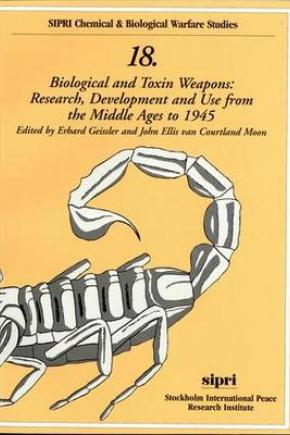Biological and Toxin Weapons: Research, Development and Use from the Middle Ages to 1945
Contents
1. Introduction (John Ellis van Courtland Moon)
2. Biological warfare before 1914 (Mark Wheelis)
3. Biological sabotage in World War I (Mark Wheelis)
4. Poland and biological weapons (Jerzy Witt Mierzejewski and John Ellis van Courtland Moon)
5. French activities related to biological warfare, 1919–45 (Olivier Lepick)
6. Biological warfare activities in Germany, 1923–45 (Erhard Geissler)
7. The Japanese biological warfare programme: An overview (Sheldon Harris)
8. Military biology in the USSR, 1920–45 (Valentin Bojtzov and Erhard Geissler)
9. British biological warfare and biological defence, 1925–45 (Gradon B. Carter and Graham S. Pearson)
10. Canadian biological and toxin warfare research, development and planning, 1925–45 (Donald Avery)
11. US biological warfare planning and preparedness: The dilemmas of policy (John Ellis van Courtland Moon)
12. Lessons from the history of biological and toxin warfare (Erhard Geissler, John Ellis van Courtland Moon and Graham S. Pearson)
About the editors
Dr Erhard Geissler is Professor of Genetics and Head of the Bioethical Research Group, Max Delbrück Centre for Molecular Medicine, Berlin-Buch. A biologist by training, he has done research in the fields of biophysics, microbial genetics and tumour virology. He has also published extensively on the subjects of biological weapons, the social impact of genetics and other biosciences, and the responsibility of scientists and has convened several symposia on these questions. He edited the SIPRI volume Biological and Toxin Weapons Today (1986) and Strengthening the Biological Weapons Convention by Confidence-Building Measures (1990), no. 10 in the SIPRI Chemical & Biological Warfare Studies, and co-edited Control of Dual-Threat Agents: The Vaccines for Peace Programme (1994), no. 15 in the SIPRI Chemical & Biological Warfare Studies.
Dr John Ellis van Courtland Moon (PhD, American Civilization, Harvard University, 1968) is Professor of History Emeritus, Fitchburg State College, Fitchburg, Massachusetts. A cultural historian by training, he has specialized in US military history, publishing extensively in the field of chemical and biological weapons in such journals as International Security, The Journal of Strategic Studies and The Bulletin of the Atomic Scientists. He is the author of Confines of Concept: American Strategy in World War II (Garland, 1988). He has served as a member of the Harvard University Colloquium on Chemical and Biological Weapons, directed by Professor Matthew Meselson and Dr Marie Chevrier. Increasingly, his studies have centred on the ethical and cultural foundations of the taboo on chemical and biological arms.
About the series editor
Dr Jean Pascal Zanders assumed responsibility for the SIPRI Chemical and Biological Warfare Project in 1996 and is the Series Editor. He was previously Research Associate at the Centre for Peace and Security Studies at the Free University of Brussels. He is the author of a chapter in the 1997 SIPRI volume The Challenge of Old Chemical Munitions and Toxic Armament Wastes, co-author of the SIPRI fact sheets The Chemical Weapons Convention (1997) and Iraq: The UNSCOM Experience (1998), and co-author of chapters in the SIPRI Yearbooks 1997, 1998, 1999, 2000 and 2001. He has also written on regime formation and implementation of the Chemical Weapons Convention and on regional security in the Middle East with respect to chemical and biological weapons.
SIPRI Chemical & Biological Warfare Studies is a series of studies intended primarily for specialists in the field of CBW arms control and for people engaged in other areas of international relations or security affairs whose work could benefit from a deeper understanding of particular CBW matters.
This book can be ordered from all good bookshops and online booksellers or directly from OUP
OUP in the UK:
http://www.oup.com/uk/catalogue/?ci=9780198295792 (paperback)
OUP in the USA:
http://www.us.oup.com/us/catalog/general/?view=usa&ci=9780198295792 (paperback)

